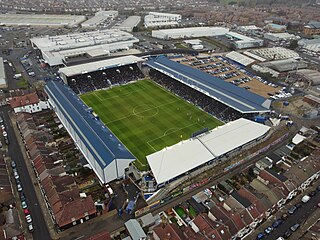Pompey , otherwise known as Pompey the Great, was a Roman statesman.
Contents
- People
- Athletes
- Military figures
- Other people
- Places
- Animals
- Arts, entertainment, and media
- Sports
- Other uses
- See also
Pompey may also refer to:
Pompey , otherwise known as Pompey the Great, was a Roman statesman.
Pompey may also refer to:

Gnaeus Pompeius Magnus, known in English as Pompey or Pompey the Great, was a general and statesman of the Roman Republic. He played a significant role in the transformation of Rome from republic to empire. Early in his career, he was a partisan and protégé of the Roman general and dictator Sulla; later, he became the political ally, and finally the enemy, of Julius Caesar.
Titus Labienus was a high-ranking military officer in the late Roman Republic. He served as tribune of the Plebs in 63 BC. Although mostly remembered as one of Julius Caesar's best lieutenants in Gaul and mentioned frequently in the accounts of his military campaigns, Labienus chose to oppose him during the Civil War and was killed at Munda. He was the father of Quintus Labienus.

Portsmouth Football Club is a professional association football club based in Portsmouth, Hampshire, England. The team is currently competing in the EFL Championship, the second level of the English football league system in the 2024–25 season after winning the 2023–24 EFL League One title. Portsmouth are nicknamed Pompey, a local nickname used by both His Majesty's Naval Base, Portsmouth and the city of Portsmouth. The club adopted blue shirts in 1912 and have mostly used a combination of white shorts and red socks since 1946.
Gunner, the Gunner, Gunners or the Gunners may refer to:

Fratton Park is a football ground in Portsmouth, Hampshire, England, and is the home of Portsmouth Football Club. Fratton Park's location on Portsea Island is unique in English professional football, as it is the only professional English football ground not located on the mainland of Great Britain. Fratton Park has been the only home football ground in Portsmouth F.C.'s entire history.
Athenaeum may refer to:
Tali may refer to:

The gens Pompeia was a plebeian family at ancient Rome, first appearing in history during the second century BC, and frequently occupying the highest offices of the Roman state from then until imperial times. The first of the Pompeii to obtain the consulship was Quintus Pompeius in 141 BC, but by far the most illustrious of the gens was Gnaeus Pompeius, surnamed Magnus, a distinguished general under the dictator Sulla, who became a member of the First Triumvirate, together with Caesar and Crassus. After the death of Crassus, the rivalry between Caesar and Pompeius led to the Civil War, one of the defining events of the final years of the Roman Republic.
Stephen Andrew Berry is an English former professional footballer who played in the Football League for Portsmouth, Aldershot, Sunderland, Newport County, Swindon Town and Northampton Town, in the German second division for Darmstadt, and in the Hong Kong First Division League for Instant-Dict.
Pompeii is a ruined Roman city near modern Naples in the Italian region of Campania.
The South Coast Derby is a term used to describe football matches played between Portsmouth Football Club and Southampton Football Club. The term is popular in broadcast media and newspapers.
Portsmouth Women, formerly known as "Portsmouth Ladies", is a professional women's football club for the south coast city of Portsmouth in Hampshire, England. The club currently plays in the Women's Championship. Their male counterparts are Portsmouth F.C.

Frederick Clifford "Pompey" Elliott was an Australian rules footballer in the Victorian Football League (VFL).
Portsmouth Football Club is a professional association football club based in Portsmouth, England, founded in 1898. Football was first played in Portsmouth from at least the middle of the 19th century, brought to the Victorian era military town, by soldiers, sailors and dockers from other places in England. In Northern England the rules of football were already well established. Portsmouth Association Football Club was an amateur team founded in 1883 by architect Arthur Edward Cogswell. Its most famous player was Sir Arthur Conan Doyle, who played as goalkeeper under the pseudonym "A.C. Smith." The club disbanded in 1896, and Cogswell designed the first buildings at Fratton Park. Portsmouth Town was an amateur team before Portsmouth became a city in 1926. They competed in cup competitions, attracted several thousand spectators by 1891, and attempted to become Portsmouth's first professional club, but failed. Royal Artillery (Portsmouth) Football Club was formed by the Portsmouth regiment of the Royal Artillery. Established in 1894, they were notable for their competitive success and support from the local community. The team played home games at the United Services Recreation Ground and achieved significant victories.
Paul Frank Went was an English footballer who played professionally for five clubs over a fifteen-year period. He was one of that generation who bridged the gap between terminological eras, beginning his career as a centre-half and ending it as a central defender despite playing a similar role throughout.
During the 2003–04 English football season, Portsmouth F.C. competed in the Premier League. It was their first ever season in the Premiership and the first in English football's top flight since the 1987–88 season.
Harold Elliott may refer to:

Ryan Dale Williams is an Australian professional footballer who plays as a winger for Indian Super League club Bengaluru.

Alexander Ian Grant is a professional soccer player who plays as a defender for Chinese Super League club Tianjin Jinmen Tiger. Born in England, he has represented Australia at youth level.
The 2013–14 season was Portsmouth's first campaign back in the Football League Two after being relegated from the EFL Championship and League One in two successive seasons. This was the first time that Portsmouth played in the fourth tier of English football since the 1979–80 season.